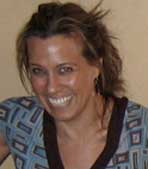 |
|||
| College of Education Home | News & Events | Make a Gift | UW Alumni | |||
|
February 2011 | Return to issue home
Huckabay Fellow Aims to Improve College Writing Skills
College of Education student Sasha Lotas is one of 10 University of Washington 2010 Huckabay Fellows. A third-year Ph.D. student in the College of Education, Lotas will be working with mentors Dr. Deborah McCutchen, faculty at the College of Education, and Daniel Tarker, director of The Loft Writing Center at North Seattle Community College (NSCC), on her proposed Huckabay work. "Teaching is Sasha’s passion, and teaching underprepared students for college success is her mission," McCutchen states. "Sasha came to our Learning Sciences program in the College of Education with the explicit goal to increase her understanding of learning so that she could improve her own teaching. She holds a deep commitment to the adolescents and adults for whom traditional schools have been least helpful, and she has worked for many years in literacy programs to support the reading and particularly the writing of these students." Research shows that academic writing skills are critical for college readiness and employment. Yet community college students are often placed in remedial writing courses and struggle with basic writing mastery. Lotas’ work will focus on morphological awareness or, more simply put, vocabulary instruction. "Morphological awareness is the ability to see the meaningful pieces within words and manipulate them to both understand unfamiliar words during reading and articulate complex ideas during writing," Lotas explains. "Morphological awareness is relatively new as an application to help writing instruction, particularly academic literacy. It helps students see grammar as living language. Students can be empowered through morphological awareness and, perhaps, make choices that will improve their writing." This project will provide an intervention to a group of developmental writing students at North Seattle Community College and will compare results to a comparison group that did not receive the intervention. Lotas’ work is based on a project that her adviser, McCutchen, led with a team of researchers on morphological awareness in fifth-grade learners. Within the framework of the North Seattle Community College tutoring system for developmental writing students, all students receive weekly tutoring sessions on writing and grammar. Lotas and her team will have tutors conduct a 10-minute vocabulary lesson in sessions. This morphological awareness curriculum will supplement the students’ work on homework and writing projects. "It is very exciting for the North Seattle Community College faculty and tutors because we are always looking for ways to be innovative," says Tarker. "By mastering the manipulation of the word, we think this will improve the larger context of our student’s writing. If you have mastery over the words parts and how to change those, you’ll develop better overall texts." At the end of the quarter, the students will be assessed to "show if the intervention has helped them to better manipulate words into sentences that effectively convey their ideas." Ultimately, the project aims to help developmental writing students develop academic literacy skills. This goal aligns with Lotas’ own research interests of adult literacy. As she explains, "I got my start in literacy when I worked in Washington, D.C., on literacy with teenage dropouts and adults who were trying to bridge alternative education programs into post-secondary education." It was challenging work, which left her with just as many questions as answers. For example, Lotas worked with a 16-year-old who read at a fifth-grade level and was raising two children. The teaching process presented challenges for mixing the learner’s everyday math skills with her learning process. "As a teacher, I need to combine what this learner is doing in everyday life, like figuring out how many diapers she needs, with her belief that she can’t do multiplication," Lotas explains. "In fact, she does multiplication all the time in her day-to-day routines. So I try to make those skills relevant." Lotas found that adult literacy was her true passion. Within that, she focuses on academic literacy because she believes, "that academic literacy gives one an important voice, gives people access to important conversations." McCutchen has been an excellent resource and supporter for Lotas’ growth in this field. McCutchen mentored Lotas’ research for a master’s thesis around writing instruction in a GED program, providing guidance with understanding scholarly research on the topic and creating space for Lotas’ reflection. There will be a fair amount of reflection throughout this Huckabay project as well, both individually and with her project mentors. McCutchen and Tarker will oversee Lotas in a variety of analytical steps to assess the work. Beyond the quantitative analysis on the intervention results, Lotas will also gather qualitative data from students about the intervention instruction and feedback from the North Seattle Community College tutors on how morphological awareness curriculum supported or excited them as teachers.February 2011 | Return to issue home | |||
|
|||
